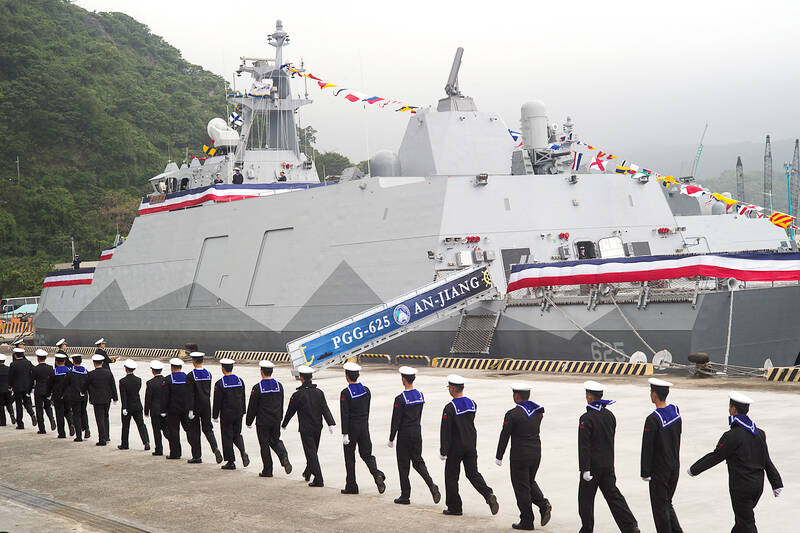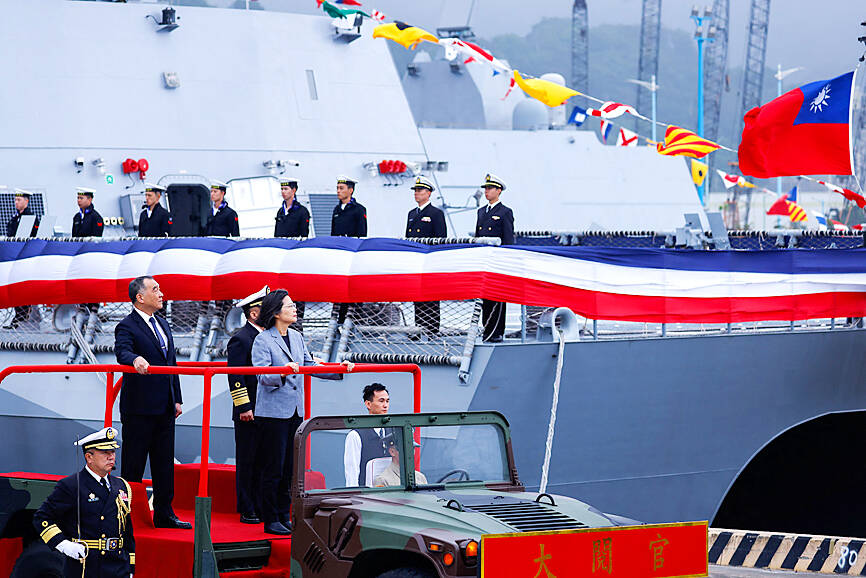President Tsai Ing-wen (蔡英文) yesterday presided over a ceremony at Yilan County’s Suao Harbor (蘇澳港), where the navy took delivery of two indigenous Tuo Chiang-class corvettes.
The corvettes, An Chiang (安江) and Wan Chiang (萬江), along with the introduction of the coast guard’s third and fourth 4,000-tonne cutters earlier this month, are a testament to Taiwan’s shipbuilding capability and signify the nation’s resolve to defend democracy and freedom, Tsai said.
The vessels are also the last two of six Tuo Chiang-class corvettes ordered from Lungteh Shipbuilding Co (龍德造船) by the navy, Tsai said.

Photo: Sam Yeh, AFP
The first Tuo Chiang-class vessel delivered was Ta Chiang (塔江) in 2021, with the vessel’s excellent performance earning international praise after it passed operational tests and evaluations, she said.
The wide recognition motivated the government to speed up corvette production, which allowed for the early delivery of the corvettes yesterday, she said.
The Tuo Chiang-class corvettes have stealth capability, improved stability and are the first small navy ships to be equipped with air defense missiles, she added.

Photo: Ann Wang, Reuters
The vessels also have more powerful performance than the outgoing Chin Chiang-class corvettes which they are to replace, Tsai said.
Su Tzu-yun (蘇紫雲), a research fellow at the Institute for National Defense and Security Research, said the Tuo Chiang-class corvettes, which some media outlets have described as “carrier killers,” are “small, but mighty.”
With a displacement of only 685 tonnes, the highly mobile corvettes can travel at 40 knots, Su said.
Their stealth capability means they have a radar cross-section as small as the size of a fishing boat, he said.
Crucially, they are equipped with layered weapons systems giving them formidable firepower, including TC- 2N air defense missiles, the Hsiung Feng II and Hsiung Feng III anti-ship missiles, and OTO Melara 76mm guns, he said.
The corvettes also have the Phalanx close-in weapons system, which can intercept missiles, as their final line of defense, he added.
The corvettes can be used in combination with land vehicle-mounted missile systems under the planned coastal combat command to guard offshore areas and prevent enemies from attempting landing operations, while submarines are deployed further from shore as a deterrence, thereby forming a multilayered barrier zone, Su said.
The navy plans to acquire five more Tuo Chiang-class corvettes, the contract for which was awarded to Lungteh in March last year.
Also yesterday, Taiwan tested its air defenses in early morning drills using surface-to-air missiles, and air, land and naval forces, saying it would continue to intensify training in the face of China’s frequent military activities nearby.
The Air Force Headquarters in a brief statement said that between 5am and 7am it carried out “overall air defense combat plan exercises” using domestic Sky Bow and US-made Patriot surface-to-air missiles in conjunction with aircraft and navy ships.
The drills were “to inspect and verify the joint air defense combat command and control of the three branches,” it said, adding that the outcome was “good.”
“In the face of Chinese aircraft and ships frequently encroaching into Taiwan’s surrounding sea and air space, the air force will continue to increase its training intensity to deal with potential threats,” the statement said.
Ministry of National Defense spokesman Sun Li-fang (孫立方) said that although there was no direct link between what he called routine annual drills such as these and current tensions, the threat from China is continuing to rise.
“Working out how to bolster our overall military capabilities is very important,” he told reporters.
Additional reporting by Reuters

The Central Election Commission has amended election and recall regulations to require elected office candidates to provide proof that they have no Chinese citizenship, a Cabinet report said. The commission on Oct. 29 last year revised the Measures for the Permission of Family-based Residence, Long-term Residence and Settlement of People from the Mainland Area in the Taiwan Area (大陸地區人民在台灣地區依親居留長期居留或定居許可辦法), the Executive Yuan said in a report it submitted to the legislature for review. The revision requires Chinese citizens applying for permanent residency to submit notarial documents showing that they have lost their Chinese household record and have renounced — or have never

A magnitude 5.6 earthquake struck off the coast of Yilan County at 12:37pm today, with clear shaking felt across much of northern Taiwan. There were no immediate reports of damage. The epicenter of the quake was 16.9km east-southeast of Yilan County Hall offshore at a depth of 66.8km, Central Weather Administration (CWA) data showed. The maximum intensity registered at a 4 in Yilan County’s Nanao Township (南澳) on Taiwan’s seven-tier scale. Other parts of Yilan, as well as certain areas of Hualien County, Taipei, New Taipei City, Taoyuan, Hsinchu County, Taichung and Miaoli County, recorded intensities of 3. Residents of Yilan County and Taipei received

Taiwan has secured another breakthrough in fruit exports, with jujubes, dragon fruit and lychees approved for shipment to the EU, the Ministry of Agriculture said yesterday. The Animal and Plant Health Inspection Agency on Thursday received formal notification of the approval from the EU, the ministry said, adding that the decision was expected to expand Taiwanese fruit producers’ access to high-end European markets. Taiwan exported 126 tonnes of lychees last year, valued at US$1.48 million, with Japan accounting for 102 tonnes. Other export destinations included New Zealand, Hong Kong, the US and Australia, ministry data showed. Jujube exports totaled 103 tonnes, valued at

BIG SPENDERS: Foreign investors bought the most Taiwan equities since 2005, signaling confidence that an AI boom would continue to benefit chipmakers Taiwan Semiconductor Manufacturing Co’s (TSMC, 台積電) market capitalization swelled to US$2 trillion for the first time following a 4.25 percent rally in its American depositary receipts (ADR) overnight, putting the world’s biggest contract chipmaker sixth on the list of the world’s biggest companies by market capitalization, just behind Amazon.com Inc. The site CompaniesMarketcap.com ranked TSMC ahead of Saudi Aramco and Meta Platforms Inc. The Taiwanese company’s ADRs on Tuesday surged to US$385.75 on the New York Stock Exchange, as strong demand for artificial intelligence (AI) applications led to chip supply constraints and boost revenue growth to record-breaking levels. Each TSMC ADR represents